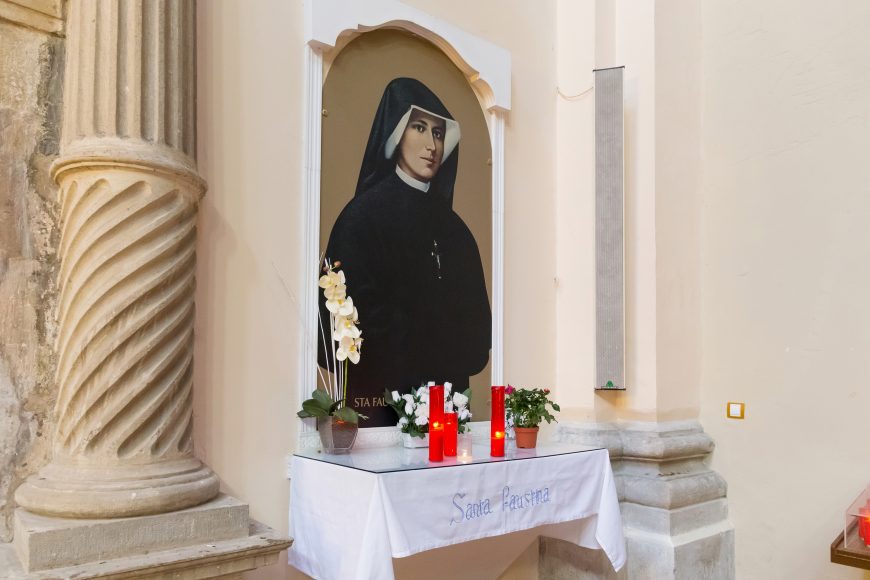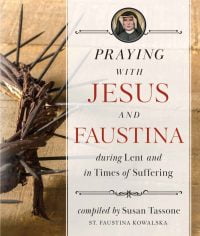What makes your book different from other devotionals?
Praying with Jesus and Faustina during Lent and in Times of Suffering is to be used year-round, not just for Lent! This book perfectly addresses the terrible times and the terrible sufferings we are experiencing today and the everyday sufferings we are beset with—trials of various kinds, temptations, the misery of our weaknesses, conflicts with others, misunderstandings, and more than ever persecutions.
This unique book focuses on the passion through the words of Jesus and Faustina! The focus is coming from the actual words of Jesus and Faustina which makes it special. You don’t find contemporary books like this. There has never been a combination like this between Jesus and Faustina!
Jesus told Faustina many things about His passion. I wanted to capture His words about His sorrows and His sacrificial death that He spoke of to Faustina and is saying to us beyond Lent!
Let me give you an example from the book of what Jesus tells us is important to him:
Ash Wednesday
Jesus said: You please Me most when you meditate on My sorrowful passion. The contemplation of My painful wounds is of great profit to you and it brings Me great joy. (1512, 369)
If you want to please and delight Jesus this is the one way He wants you to do that. It opens the window on how to please and delight the Lord.
Jesus said: There are few souls who contemplate My passion with true feeling; I give great graces to souls who meditate devoutly on My passion. (737)
Jesus tells Faustina: My daughter, your compassion for Me refreshes Me. By meditating on My passion, your soul acquires a distinct beauty. (1657)
Faustina said: In difficult moments I must take refuge in the wounds of Jesus; I must seek consolation, comfort, light, and affirmation in the wounds of Jesus. (226)
We have an extraordinary special section on St. Faustina “taking refuge in the wounds of Jesus.” It includes:
✥ An unusual litany by St. Clare of Assisi meditating on the five wounds of Jesus’ hands, feet, and sacred heart
✥ A prayer calling down the precious blood of Jesus
✥ A rare litany of the precious blood written by Catherine of Siena; she had a special devotion to the precious blood and prayed this litany constantly. One of my favorites!
✥ A prayer on the wounding of Christ’s shoulder (Padre Pio talks about this)
✥ A prayer to the Holy Face written by the little flower, St. Therese.
✥ A prayer on Christ’s wearing a crown of thorns which graces the cover of my book.
Faustina made several notes in her Diary about this practice and its power in leading souls to deeper levels of trust in the Lord’s love and mercy.
What does this book do for the reader when they focus on the Passion?
Jesus said: You please me most when you meditate on My Sorrowful Passion. (1512)
The contemplation of My painful wounds is of great profit to you, and it brings Me great joy. (369)
If you want to please and delight Jesus this is one way, He wants you to do that. It opens the window on how to please and delight the Lord.
Jesus was pleased “best” and “most” when Faustina did so, and it brought him great joy. Shouldn’t we do what brings Jesus great joy and pleases Him the most?
United ourselves to Him is as He says: of “great profit” that will last for all eternity!
We have Jesus leading Faustina through the way of the cross. And we have Faustina’s reactions and experiences of being led by Jesus.
We know that Faustina received the stigmata. His passion was imprinted on her body in an invisible manner, but no less painfully. How we suffer is often unseen by others. We have our own stigmatas!
Jesus permitted St. Faustina, in a remarkable way, to experience the pain His soul experienced during His Sacred Passion. She described it like a “painful echo in His Sacred Heart.” (1657).
“My soul, too, was inundated by a sea of bitterness,” she wrote. Her compassion for Jesus intensified because she was willing to suffer with Him.
The friends of the Cross are few. But St. Faustina had courage. She reached out to her Savior. She said: “My whole soul was drawn close to Jesus.” (1657)
Jesus: My daughter, your compassion for Me refreshes Me. (1657)
Faustina: I suffered pain in my body: in my hands, my feet and my side. Jesus is sending me this kind of suffering that I may make reparation for sinners (942). His Passion was imprinted on my body in an invisible manner, but no less painfully (964). In difficult moments I must take refuge in the wounds of Jesus; I must seek consolation, comfort, light, and affirmation in the wounds of Jesus. (226)
How does meditating on the Passion benefit others?
Faustina shares the benefits she received when meditating on Jesus’ sufferings:
✥ When I meditate upon the Passion of Jesus I get a clear understanding of many things I could not comprehend before. (267)
✥ He who wants to learn humility should reflect upon the Passion of Jesus. (267)
✥ When I began to immerse myself in the divine passion, the great worth of the human soul and the great evil of sin were revealed to me. (1762)
✥ Jesus gave me to know of the sufferings he experienced there. The world will learn about them on the day of judgment. (1515)
✥ My soul was filled with pain and longing; in my soul, I felt great hatred for sin, and even the smallest infidelity on my part seemed to me like a huge mountain for which I must expiate my mortification and penance. (948)
The fruit of meditating on the Passion leads to greater self-sacrifice, it sanctifies us, it makes us more compassionate, it is of great benefit to others.
What’s the purpose of suffering?
Throughout the book, Jesus shared with her the value of suffering and how you can transform your work and suffering into a sacrifice for peace in your hearts, peace in the family, peace in the world, the conversion of your loved ones, and for the deceased when we offer it to God.
Jesus said: Join your little sacrifices to My sorrowful Passion. (1512)
The smallest sacrifice finds great value in My eyes, . . . (639)
Jesus taught Faustina how to treat trials as a positive opportunity to learn love of neighbor. Whoever turned to her for help, she was kind, humble and polite.
She overcame her tiredness, impatience or that reflex of unwillingness. All this as the expression of the will of God. She reflected Jesus compassion and mercy every day not just during Lent.
That the mystery of the incarnation of His Son may once more be repeated in me, and that once again His sorrowful Passion may unfold before my eyes. I then try to make it easier for Jesus to pass through me to other souls. I go everywhere with Jesus; his presence accompanies me everywhere. (486)
The eighth station (Jesus consoles the women of Jerusalem), the reflection in my book shares this from St. Faustina:
O Jesus, make my heart sensitive to all the sufferings of my neighbor, whether of body or soul. O my Jesus, I know that you act toward us as we act toward our neighbor. (692)
How did Faustina cope with everyday sufferings?
Another unique feature of this book is a section called “in times of suffering,” which we all know is not limited to Lent!
Faustina suffered just as we all do! She suffered emotionally from a terminal illness; she had the invisible stigmata and experienced the passion in her body. She suffered emotionally because the sisters didn’t believe she was sick and thought she was trying to avoid work. They made fun of her and insulted her. They called her ‘dump.’
She suffered mentally because she was having visions of Jesus and Mary for three years; she doubted herself and thought she was going crazy!
She was given the task from Jesus to spread the message of Divine Mercy and she had no idea how she would do that from a convent!
Faustina: Today, I experienced a great suffering during the visit of our sisters. I learned of something that hurt me terribly, but I controlled myself so that the sisters didn’t notice anything. For some time, the pain was tearing my heart apart, but all that is for the sake of poor sinners…. O Jesus, for poor sinners. Jesus, my strength, stay close to me, help me…. (875)
Jesus: Pray for those who have made you suffer and wish them well. (1628)
Faustina: Jesus, do not leave me alone in suffering. (1489)
Jesus: My daughter, do not be afraid of what will happen to you. I will give you nothing beyond your strength. You know the power of My grace; let that be enough. (1491)
Jesus: Know, My daughter, that your silent day-to-day martyrdom in complete submission to My will ushers many souls into heaven. And when it seems to you that your suffering exceeds your strength, contemplate My wounds, and you will rise above human scorn and judgment. Meditation on My Passion will help you rise above all things. (1184)
Jesus: It is in my Passion that you must seek light and strength. (654)
And when she couldn’t steep herself in His Passion Jesus said this:
I complained to the Lord that I had wanted so much to steep myself in His sorrowful Passion, but that my sufferings had not allowed me to do so. Then Jesus said to me, My daughter, know that if I allow you to feel and have a more profound knowledge of My sufferings, that is a grace from Me. But when your mind is dimmed and your sufferings are great, it is then that you take an active part in My Passion, and I am conforming you more fully to Myself. It is your task to submit yourself to My will at such times, more than at others…… (1695)
Faustina: And the Lord also gave me to understand what unimaginable glory awaits the person who resembles the suffering of Jesus here on earth. That person will resemble Jesus in his glory. (604)
Is there any value to suffering?
There is power in intercessory suffering!
Jesus told St. Faustina:
I have need of your sufferings to rescue souls. (1612) There is but one price at which souls are bought, and that is suffering united to my suffering on the cross. (324) You will join prayers, fasts, mortifications, labors, and all sufferings to My prayer, fasting, mortification, labors and sufferings and then they will have power before My Father. (531) Help me, My daughter, to save souls. Join your sufferings to My Passion and offer them to the Heavenly Father for sinners.” (1032)
Jesus said to her: Your suffering will become a source of your sanctification. (1487)
Then he showed her a large ciborium fill with sacred hosts.
He told Faustina: These are hosts which have been received by the souls for whom you have obtained the grace of true conversion during this Lent. (640)
St. Faustina acknowledged the effectiveness of joining her penitential works and suffering with prayer as a means of bring sinners to conversion.
She said: “I saw that my suffering and prayer shackled Satan and snatched many souls from his clutches. (1465)My sacrifice is nothing in itself, but when I join it to the sacrifice of Jesus Christ, it becomes all-powerful and has the power to appease divine wrath.” (482)
What an image.Shackling. . . and snatching. . . from hisclutches. It sounds like a fairy tale except, of course, it’s true. It’s you who can snap on the shackles and snatch others from . . . Satan. He’s no fairy-tale character. Frightening, yes. Invincible, no. It’s you who has the power — by offering up your suffering and prayers — to help save countless souls.
What wisdom does Faustina say about sufferings?
Suffering is the greatest treasure on earth, it purifies the soul.
St. Faustina teaches us: Suffering is a great grace; through suffering the souls becomes like the savior in suffering love becomes crystallized the greater the suffering, the purer the love. (57)
St. Faustina said: If the angels were capable of envy, they would envy us humans for two things: one is the privilege to receive holy communion, and the other is suffering. (1804)
Oh, if only the suffering souls knew how it is loved by God, it would die of joy and excess of happiness! Some day, we will know the value of suffering but then we will no longer be able to suffer. The present moment is ours. (953)
I am never alone, because he (God) is my constant companion. He is present tome at every moment. (318)
Faustina never forgot the holy souls in purgatory! She offered her sufferings for the souls. They visited her and told her what they needed. They wanted her fasting, her spiritual exercises and masses.
We can give alms year-round for our deceased loved ones by offering masses,
A novena of masses, and Gregorian masses. Please contact the Pious Union of St. Joseph at www.pusj.org This is the Year of St. Joseph. In his honor offer Masses for yourselves, your families and your deceased loved ones! Put Gregorian masses in your will!
What does Jesus emphasize when He talks about His Passion?
Jesus emphasizes his love for us! If we want to understand mercy we need to look at what Jesus did. The mystery of divine mercy is revealed totally in his Passion.
The Passion of Jesus is the most powerful sign of God’s love for us.
Faustina: God, You could have saved thousands of worlds with one word; a single sigh from Jesus would have satisfied Your justice. But You Yourself, Jesus, purely out of love for us, underwent such a terrible Passion. Your Father’s justice would have been propitiated with a single sigh from You, and all Your self-abasement is solely the work of Your mercy and Your inconceivable love. (1747)
Jesus said: Remember My Passion, and if you do not believe My words, at least believe My wounds. (379)
I came down from heaven out of love for you; I lived for you; I died for you, I created the heavens for you. (853)
Before I made the world, I loved you with the love you are experiencing today, and throughout the centuries, my love will never change. (1754)
If my death has not convinced you of my love what will? (580)
We need to appreciate that.
In the constitutions of St. Faustina’s Congregation of the Sisters of Our Lady of Mercy it is recommended that the sisters ponder frequently what God did and suffered in His Redemption through His Passion.
St. Faustina came to know the mystery of God’s mercy. She said all our lives are immersed in His divine mercy every day! And most profoundly in the sacraments of confession and the Eucharist!
Go to confession regularly! Receive the Eucharist, and if you can’t because of covid, do a spiritual communion which we have in our book!
Our mercy deepens with the sacraments. It expands our hearts to become merciful. In addition, the rosary, solemnities of the church and all the good God put in her life and in the world. She said his mercy is like a golden thread running through our lives.



